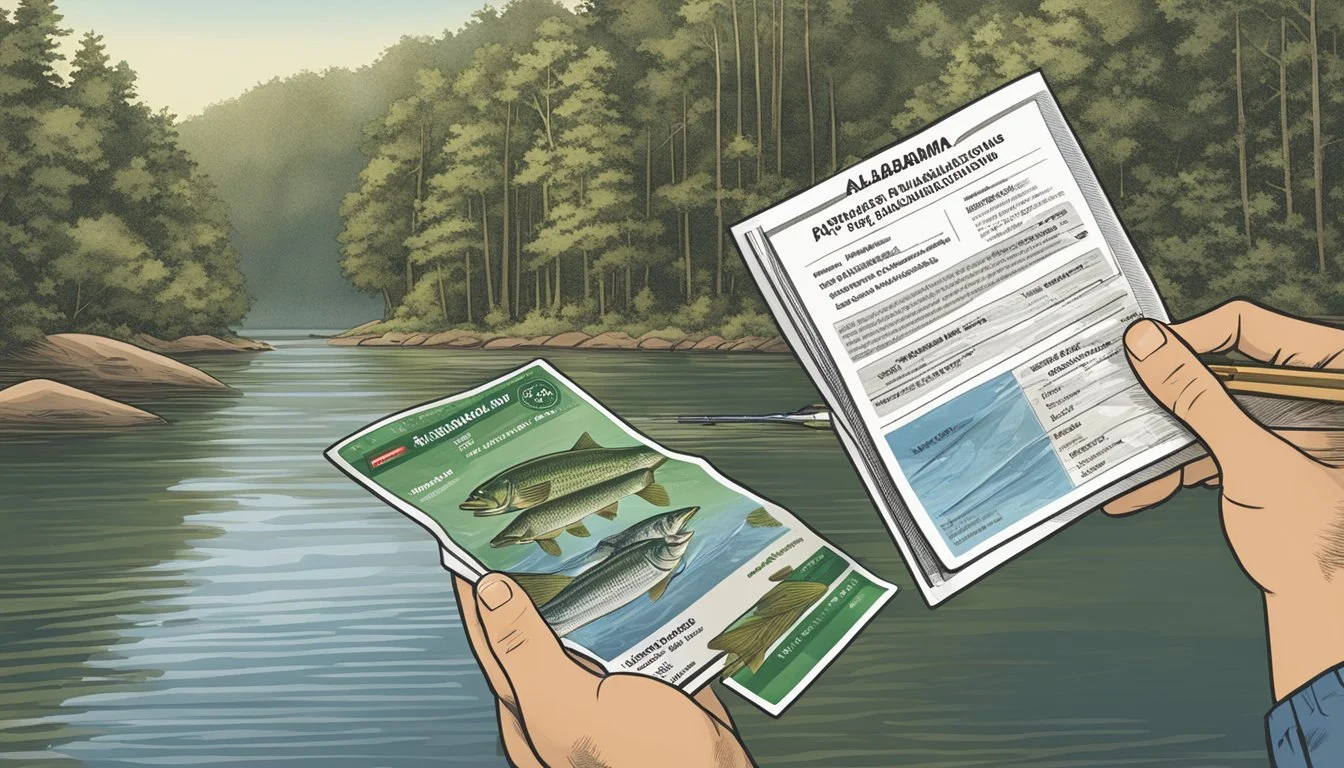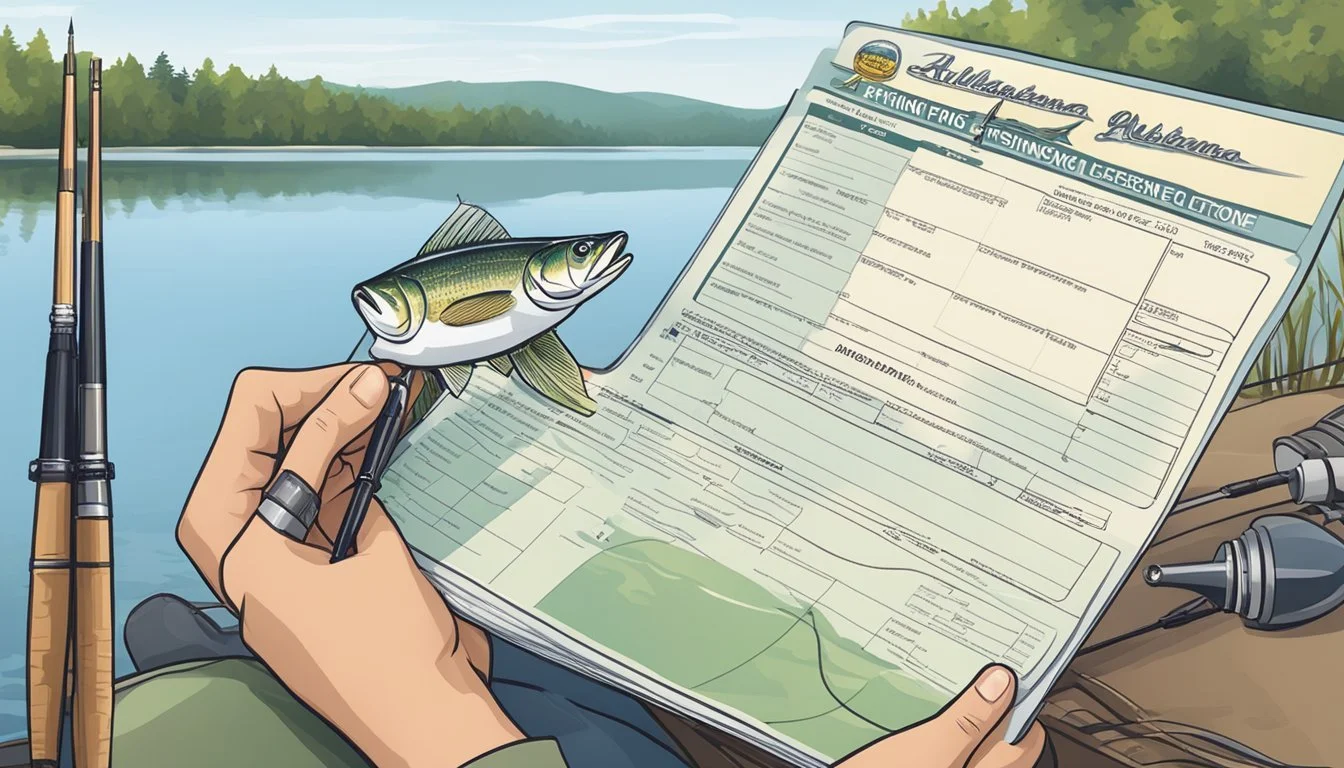How to Get an Alabama Freshwater Fishing License
Your Simple Guide
Securing a freshwater fishing license in Alabama is a straightforward process designed for the convenience of both resident and non-resident anglers. Anglers contribute to the conservation and upkeep of natural aquatic resources through the purchase of their licenses, aligning with the state's commitment to protecting its diverse fish (What wine goes well with fish?) populations. Licenses ensure responsible fishing practices and help Alabama leverage federal funds sourced from excise taxes on fishing equipment and gasoline purchases for boating.
To obtain a fishing license in Alabama, one must distinguish whether they fall under resident or non-resident categorization. Residents are typically required to possess a valid Alabama driver’s license or a valid Alabama non-driver's ID, having lived continuously in the state for at least 90 days and possessing a Social Security number. Non-residents must follow separate guidelines to acquire their fishing permissions. These licenses not only permit legal fishing in Alabama's freshwater bodies but also come in different types, from recreational to commercial, catering to the needs of all types of anglers.
With licenses being valid from September 1st through August 31st of the following year, planning to secure a fishing license should be considered well ahead of any planned fishing excursions. It's integral to Alabama's fishing community that the licensing process is respected to maintain the health and abundance of the state's freshwater systems. This ensures that Alabama continues to offer exceptional fishing experiences for largemouth bass and other popular freshwater species.
Understanding Alabama Fishing Regulations
When fishing in Alabama, it's essential to be aware of state regulations to ensure a legal and enjoyable experience. This section details the specifics concerning who needs a license, residency qualifications, age requirements, and any exemptions provided under these rules.
Fishing License Requirements
In Alabama, the Department of Conservation and Natural Resources mandates that a fishing license is necessary for freshwater fishing. Both residents and non-residents who are 16 years of age and older must obtain a freshwater fishing license to fish in public waters. There's a distinction between licenses for freshwater and saltwater angling, and the appropriate license must be chosen based on the intended fishing activity.
Residency Criteria
To purchase a resident fishing license, the individual must have a valid Alabama driver's license or Alabama non-driver’s ID card. Residents must have lived in Alabama for a continuous period of 90 days and provide their Social Security number. These prerequisites help the state regulate fishing activity and manage aquatic resources effectively.
Age Considerations
Anyone above the age of 16 is required to have a license to fish in Alabama's waters. For younger anglers, licenses are typically not necessary, encouraging youth participation in the sport under the guidance of licensed adults. Age-based regulations help the state to foster responsible fishing habits among the younger population.
Exemptions for Specific Groups
Certain groups are exempt from purchasing an Alabama fishing license. These include disabled veterans and landowners fishing on their own property. The state also offers a Wildlife Heritage License, which is an alternative for some forms of hunting and fishing. Meanwhile, there are special provisions for lifetime licenses, which can simplify the licensing process for avid anglers in the long term.
Types of Alabama Fishing Licenses
Alabama offers a variety of fishing licenses to suit the needs of anglers ranging from occasional hobbyists to seasoned fishermen. These licenses are essential for anyone planning to fish in Alabama's freshwater bodies, including residents and non-residents.
Annual and Short-Term Licenses
Annual Licenses: These are suitable for individuals who fish frequently throughout the year. An annual freshwater fishing license is priced at $16.15 for residents. Non-residents can also obtain an annual non-resident freshwater fishing license, enabling them to fish in Alabama's freshwater sources throughout the year.
Short-Term Licenses: For those planning a fishing trip, Alabama offers a 7-day trip license for freshwater fishing or short-term options like a daily fishing license for tourists or occasional anglers. This provides a flexible option for individuals or groups on a family trip who do not require a full year's coverage.
Lifetime Licenses
Lifetime Fishing Licenses: These licenses are an investment for avid anglers, providing lifetime access to Alabama's freshwater resources. Residents of Alabama have the unique opportunity to purchase a lifetime fishing license, which removes the need for yearly renewal. Prices vary based on the age of the applicant at the time of purchase.
Specialty and Combo Licenses
Wildlife Heritage License: This license type allows holders to fish in designated public waters, but it does not cover the privileges of a full fishing license.
Freshwater Commercial Fishing License: Designed for individuals who fish for a living, this license is necessary for those engaged in the sale of freshwater fish.
Combination Licenses: The state also offers combo licenses like the freshwater and saltwater annual fishing license combo for residents, which grants the convenience of fishing in both freshwater and saltwater with a single license purchase.
Where and How to Purchase a License
Purchasing an Alabama freshwater fishing license is a straightforward process that can be completed through various locations and methods. Whether one prefers the convenience of online services or the in-person experience, Alabama provides both options for residents and non-residents.
In-Person Locations
Alabama residents can purchase a freshwater fishing license from numerous in-person locations. Probate offices and license commissioners offer license services across different counties. For instance, residents in Tanner and Montgomery can visit their local probate offices. In addition, selected Walmart stores provide the convenience of buying a fishing license while shopping for other essentials. Furthermore, the Jacksonville District Office, along with other designated license agents, can assist individuals with the purchase of their fishing licenses. It's important to consider that issuance fees may apply and vary by location.
Online and Telephone Options
For those who prefer the digital convenience, purchasing a license online is available through the official Alabama Department of Conservation and Natural Resources website. This option allows individuals to secure a fishing license from anywhere with internet access. Residents can also acquire a license via telephone by calling the designated number, where service representatives assist with the process. It should be noted that telephone purchases may include additional telephone convenience fees. Whether online or over the phone, the licensing services are designed to be efficient and user-friendly.
Using the Fishing License
After obtaining an Alabama freshwater fishing license, anglers gain legal access to the state's abundant freshwater resources. They are responsible for adhering to the regulations concerning catch limits and conservation efforts to maintain a sustainable fishing environment.
Public Water Access
Alabama offers a multitude of freshwater fishing opportunities across its diverse aquatic landscapes. Holders of a fishing license are entitled to access public waters including lakes, rivers, public fishing lakes (PFLs), ponds, and reservoirs. Notably, the Mobile Delta region provides a rich habitat for various freshwater game fish. Anglers can explore the scenic waterways while searching for prized species such as bass and redfish.
Catch Limits and Conservation
Licensed fishermen must comply with Alabama's established catch limits and size limits to support fish population management and conservation.
Freshwater Game Fish: Regulations are in place to ensure healthy populations of game fish species are maintained. For example, specific size limits for bass fishing help conserve larger breeding individuals.
Conservation Measures: Anglers contribute to conservation through license fees and by following the catch limits, which often vary by species and location.
Compliance with these rules ensures that the fisheries remain productive and fishing practices are sustainable for future generations.
Financial Aspects of Fishing Licenses
When purchasing an Alabama freshwater fishing license, one should be aware of the associated costs and the destination of these funds, which directly support aquatic resource management.
Pricing and Fees
The cost of a freshwater fishing license in Alabama can vary based on several factors including residency status, age, and the type of license required. Resident license fees are typically lower than those for non-residents, and there are various license durations available from short-term to lifetime licenses. Additional fees may apply for the convenience of purchasing licenses via the internet or telephone. Here's a simplified list of potential costs:
Resident Freshwater License: Varying prices
Non-resident Freshwater License: Varying prices
Convenience Fees: Applicable for online and telephone transactions
Funding and Resource Management
The revenue generated from the sale of fishing licenses is crucial for the protection, management, and education regarding Alabama's natural resources. The funds are allocated as follows:
Resource Management: 100% of the license fees, excluding issuance and convenience fees, go towards the management and protection of aquatic resources.
Federal Funds and Matching: Alabama may also receive federal funds which require matching with the state's funds, often generated from license sales.
Excise Taxes and Gasoline Purchases: Anglers contribute to these federal funds through excise taxes on fishing equipment and certain gasoline purchases, which are then partially redistributed to the states.
By purchasing a fishing license, anglers are investing in both current and future fish management and conservation efforts, ensuring a sustainable fishing environment in Alabama.
Key Information for Specific Anglers
This section provides detailed information tailored to the particular requirements of different types of anglers looking to fish in Alabama. It addresses the distinctions between freshwater and saltwater fishing licenses, elaborates on specific prerequisites for visitors and non-residents, and highlights the accommodations available for disabled anglers.
Freshwater vs. Saltwater Fishing
Freshwater Fishing: Anglers aiming to fish in Alabama's lakes, rivers, and streams require a freshwater fishing license. Alabama is renowned for its largemouth bass, amongst other freshwater species.
Saltwater Fishing: For those interested in fishing in the coastal or marine areas of Alabama, a saltwater fishing license is necessary, and they must register for the Saltwater Angler Registration. This is separate from the freshwater fishing license and is tailored to regulate and protect the state's saltwater fish populations.
Requirements for Visitors and Non-residents
Visitors and non-residents must obtain the appropriate fishing license before partaking in this activity within Alabama waters. Non-residents have the option of purchasing either short-term or annual fishing licenses based on their stay duration and fishing needs.
Short-term Licenses: Suitable for visitors planning a brief fishing trip.
Annual Licenses: More cost-effective for frequent visitors or those planning an extended stay.
Provisions for Disabled Anglers
Alabama provides specific fishing license privileges to individuals with disabilities. Those who are 100% physically disabled can apply for special licenses, potentially at a reduced cost, making it more accessible for them to engage in fishing activities.
Documentation Required: Proof of disability status is often required to qualify for these special provisions.
License Availability: Such licenses are available through the Alabama Department of Conservation and Natural Resources or authorized agents.
Additional Considerations
When acquiring an Alabama freshwater fishing license, one should be mindful of the broader implications such as educational requirements and environmental stewardship. These components are crucial for maintaining sustainable fishing practices and protecting Alabama's aquatic ecosystems.
Education and Awareness
Individuals should educate themselves about Alabama's fishing regulations and safety practices. This includes understanding the specific requirements for fishing in different bodies of water and the importance of fishing responsibly. The Alabama Department of Conservation and Natural Resources provides resources and courses to help anglers learn about proper fish handling, conservation methods, and the ecology of the local aquatic wildlife.
Wildlife and Habitat Protection
Acquiring a fishing license serves a dual purpose beyond legal compliance. It contributes financially to the protection and enhancement of Alabama's natural resources. The funds generated from license sales are invested in projects aimed at habitat preservation, pollution control, and the restoration of aquatic resources. Fish population monitoring and the development of sustainable fishing practices are also supported, thereby safeguarding Alabama’s diverse ecosystems for future generations.
Frequently Asked Questions
This section addresses common inquiries regarding the procurement and management of an Alabama freshwater fishing license.
License Validity Period
An Alabama freshwater fishing license is valid from September 1 through August 31 of the following year. Individuals should be aware that they need to renew their license annually to continue fishing legally in Alabama waters.
Updating Personal Information
License holders are responsible for keeping their personal information current. Should there be any changes to one's ID, social security number, or address, the individual must update this information promptly. This ensures the license remains valid and reduces the risk of complications during activities such as compliance checks or license renewals.
Combining Fishing with Hunting
For those interested in multiple outdoor activities, Alabama offers a convenient option to combine their fishing license with a hunting license. This combination is especially beneficial for individuals and immediate family members who enjoy engaging in both hunting and fishing throughout the license validity period. It simplifies the licensing process and may offer a cost benefit compared to purchasing the licenses separately.
Contact Information and Support
When seeking assistance for obtaining an Alabama freshwater fishing license, individuals have various resources at their disposal, from local office inquiries to online support systems.
Local District Offices
The Alabama Department of Conservation and Natural Resources operates through multiple district offices, including the Jacksonville District Office. Individuals can visit their local License Commissioner or Probate Office for personalized service and support in the licensing process. The district offices are instrumental for answering queries about fishing licenses and providing necessary information to both residents and non-residents alike.
Help Desks and Online Support
For those preferring online assistance, the Alabama Department of Conservation and Natural Resources offers extensive online support. Comprehensive help can be found on the official website, where they can purchase licenses, reprint existing licenses, and update personal information. An online help desk is also available to handle any queries or technical issues that individuals may encounter during the process.
Related Outdoor Activities and Licensing
In Alabama, outdoor enthusiasts can enjoy a variety of activities that require specific licenses. To engage in these activities legally, it is essential to understand and adhere to the state's licensing requirements.
Hunting Licenses and Regulations
Alabama offers diverse hunting opportunities, from deer to waterfowl. Individuals must obtain a hunting license before venturing into the wild, and options vary based on the game and individual circumstances. The All Game Hunting License provides comprehensive access, while specific packages like the All Access Sportsman Package include privileges such as Wildlife Management Area License and State Duck Stamp. Additionally, a Wildlife Heritage License may be required for certain activities.
Here are some key hunting license types:
Basic Hunting License: Required for anyone who hunts wildlife.
Wildlife Heritage License: For hunting of small game and fishing in Family Friendly Fishing lakes, Public Fishing Lakes not requiring a State Lakes Fishing License, and Wildlife Management areas.
Boating and Watercraft Rules
Boaters in Alabama must adhere to state regulations and ensure they carry the required equipment. Avid anglers also need to be aware of whether their fishing activities are freshwater or saltwater-based, as this determines the appropriate type of fishing license.
Key regulations and requirements for boaters include:
Boater's License: Mandatory for anyone operating a watercraft.
Equipment: Life jackets and emergency signaling devices are required on board.
For individuals planning to fish from a boat, pairing a boating license with an appropriate fishing license is necessary to ensure compliance with state laws.
Glossary of Terms
Alabama: A state in the southeastern region of the United States known for its rich biodiversity, including numerous bodies of freshwater for fishing.
Fishing: The activity of trying to catch fish, typically by using bait on a hook or by employing other methods like nets.
Fishing License: A legal permit required for fishing in various jurisdictions, including Alabama, to regulate fishing practices for conservation purposes.
ID (Identification): A document that proves an individual's identity, often required when purchasing a fishing license to establish residency and eligibility.
License: An official permit to do a particular thing; in the context of fishing, it grants the holder the right to fish in compliance with local regulations.
Freshwater Fishing: Fishing in non-saltwater environments such as rivers, lakes, and streams.
Saltwater Fishing: Fishing in oceanic bodies or areas where the sea meets freshwater sources, such as estuaries and deltas.
Annual: A term that describes something occurring once every year, like an annual fishing license, which is valid for one year from the date of purchase.
Bait: Natural or artificial substances used to attract and catch fish, often placed on the end of a hook.
Hook and Line: A traditional method of fishing using a fish hook attached to a line; often part of basic fishing gear for both freshwater and saltwater fishing.
In Alabama, individuals are required to have a license for freshwater fishing unless they are fishing on privately owned bodies of water. There are various types of fishing licenses available, such as trip licenses and family licenses, that cater to different needs and durations.
Conclusion
Securing a freshwater fishing license in Alabama is essential for anglers aiming to explore the state's diverse aquatic life. The licensing process contributes to the conservation of Alabama's natural resources, ensuring sustainability for future generations.
Steps to Acquire a License:
Determine eligibility: Individuals aged 16 to 65 must obtain a license.
Select the appropriate license: Decide between resident and non-resident options.
Choose the license duration: Licenses are available for different time frames.
Purchase: Licenses can be bought online, by phone, or at approved retailers.
Alabama residents benefit from reduced rates and should provide proof of residency, such as a driver’s license, when applying. Various discounts may apply, so it’s prudent to inquire about any applicable exemptions or special permits required for certain fishing activities.
Protecting the Environment: The purchase of a fishing license supports vital fish management programs and the maintenance of the state's aquatic habitats. Anglers are also reminded to respect fishing regulations to preserve Alabama's fishing environments.
The process to get a license is straightforward and can generally be completed in a few easy steps. By complying with the state's licensing requirements, anglers show their support for Alabama’s commitment to the conservation of its natural resources and can enjoy the rich experiences that freshwater fishing offers.










